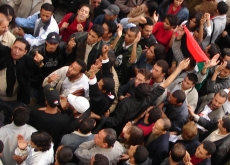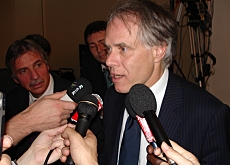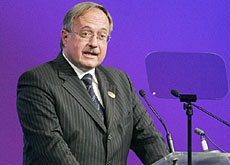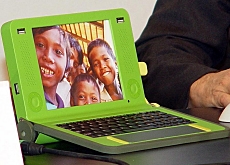Switzerland gains prestige in Tunis

The second phase of the World Summit on the Information Society, in which Switzerland has played a central and controversial role, has ended in Tunis.
At the closing ceremony on Friday evening, Swiss Communications Minister Moritz Leuenberger thanked the WSIS’ hosts and tried to nurse bruised Swiss-Tunisian relations.
Around 17,000 people from around the world attended this United Nations conference aimed at closing the so-called digital divide: the gap in access to the internet and other information tools between rich and poor countries, and even within nations.
Switzerland, as host of the first phase of the WSIS in Geneva in 2003, was always going to play an integral part. But there was an unexpected turn of events when Swiss President Samuel Schmid’s grabbed the first day’s headlines after he criticised states that muzzled civil liberties.
At the opening ceremony on Wednesday, Canal 7, Tunisia’s public television channel, cut to a commentator before Schmid said imprisoning citizens for their political beliefs was “frankly unacceptable”.
When asked on Thursday night why the Swiss government has been so outspoken about Tunisia’s human rights record, Leuenberger replied: “It’s important to note that we haven’t just made declarations against the situation in Tunisia but against all countries that have violated human rights.”
“If you take part in a summit like this one, you must seize the occasion to change the situation,” he said.
Leuenberger denied there was any serious diplomatic fallout. “Relations are good [between Switzerland and Tunisia] but it is necessary to discuss certain things.”
In contrast to Switzerland, many governments seemed to treat the WSIS like a non-event. Of the 27 heads of state who had addressed the plenary by Friday morning, only Schmid represented a developed country.
Schmid was also the only leader to allude to human rights abuses taking place in Tunisia, an unprecedented stand which earned him hero status among Tunisian civil society.
Taking liberties
The subject of human rights in Tunisia – or apparent lack of them – was always going to detract from the intended goals of the summit.
Despite UN hopes that giving Tunisia a summit watched by the world’s media would force the country to clean up its human rights act, the government of President Ben Ali appeared to up levels of intimidation in the months leading up to the summit.
Over the past week alone, one journalist was stabbed in Tunis, many others were assaulted by government officials and WSIS-related websites – including that of swissinfo – have been blocked.
On Friday, a group of Tunisian civil society members called off a hunger strike they had been holding since October 18. The strikers had demanded freedom of speech and press, freedom of association and the freeing of political prisoners.
On the final day of the summit, the United States delegation released a statement mildly rebuking the Tunisian government.
“In hosting this summit, the government of Tunisia had an opportunity and responsibility to demonstrate clearly its commitment to freedom of the press and its commitment to freedom of expression… we are therefore obliged to express our disappointment that [it] did not take advantage of this important opportunity,” it said.
Agreement
That’s not to say that the two WSIS phases have yielded nothing but diplomatic spats and denials of human rights abuses.
In Tunis it was agreed that an internet governance forum would be set up to debate the future structure and control of the web – a major sticking point that burned many barrels of midnight oil.
This forum is to include civil society actors and businesses, but its decisions will not be binding. The first one is to be held in Greece next year.
In addition, at the end of the summit, delegates adopted the Tunis Agenda for the Information Society and the Tunis Commitment, in which countries are “urged to reaffirm commitment” to “recognised challenges”.
Walter Fust, head of the Swiss Agency for Development and Cooperation (SDC), told swissinfo that “discussions here in Tunis have shown that governments want to develop the infrastructure of telecommunications”.
Tunis 2005 was billed as a “Summit of Solutions”. Many valuable economic and political ones have been reached, but the Swiss delegation leaves having posed some serious social questions, many of which affect the lives of Tunisian citizens.
swissinfo, Thomas Stephens in Tunis
The three-day second phase of the World Summit on the Information Society (WSIS) has drawn to a close in Tunis.
More than 17,500 delegates from 176 states have attended, including 5,600 governmental representatives, 5,600 NGO members, 3,600 people from the private sector and 1,000 journalists.
Swiss President Samuel Schmid was the toast of international civil society after being the only head of state to allude to human rights abuses taking place in Tunisia.
Communications Minister Moritz Leuenberger, who came to Tunis for the final two days of the conference, denied there was a diplomatic rift over Schmid’s comments.
Also attending the conference was Walter Fust, the head of the Swiss Agency for Development and Cooperation (SDC).

In compliance with the JTI standards
More: SWI swissinfo.ch certified by the Journalism Trust Initiative




You can find an overview of ongoing debates with our journalists here. Please join us!
If you want to start a conversation about a topic raised in this article or want to report factual errors, email us at english@swissinfo.ch.